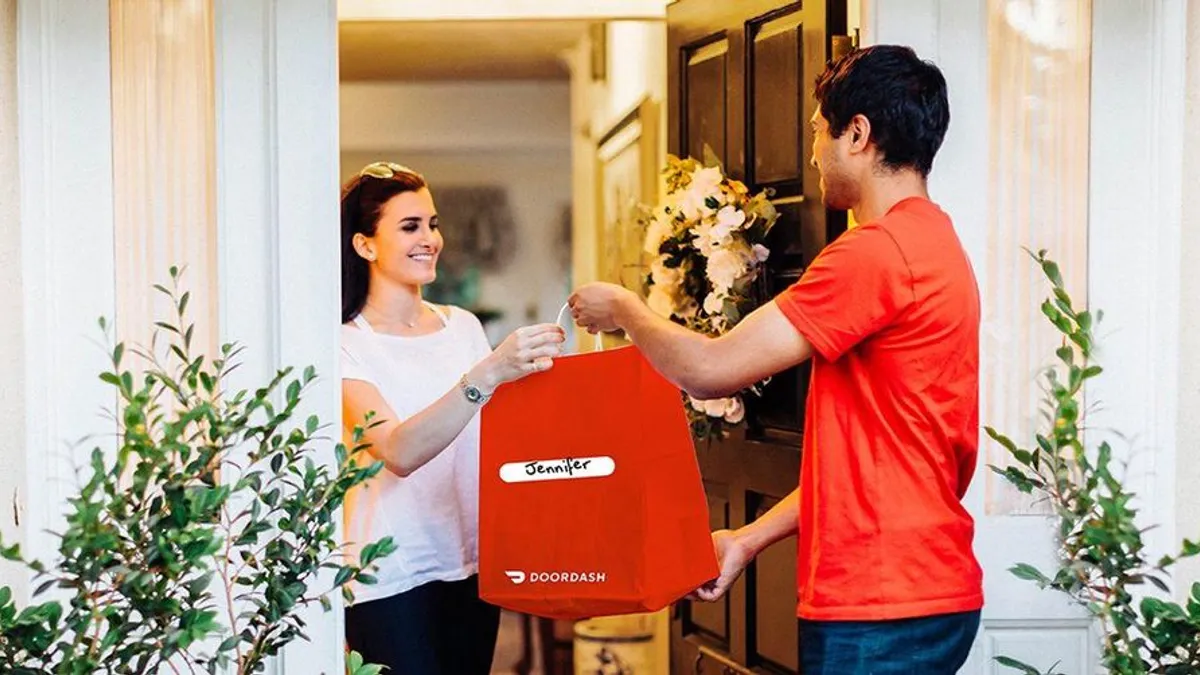UPDATE: Oct. 6, 2021: Gov. Gavin Newsom signed Assembly Bill 286 into law on Tuesday, requiring third-party delivery companies to itemize cost breakdowns of delivery transactions to both restaurants and customers.
"Gig companies have profited during the pandemic by keeping consumers and restaurants in the dark about the true cost of their services," Assemblywoman Lorena Gonzalez (D-San Diego), who introduced the bill, said in a statement. "Now, small restaurants and their customers will know what they're being charged upfront and get to see exactly how much is actually benefiting the restaurant."
Dive Brief:
- California's State Assembly this week passed Assembly Bill 286, introduced by Assemblywoman Lorena Gonzalez, to require third-party foodservice delivery companies to provide an itemized cost breakdown of each transaction to both customers and restaurants. The bill received bipartisan support on a 55 to 8 vote and is currently under review by the state Senate.
- The original bill included a permanent cap on delivery fees, but that portion was removed prior to the vote, according to Eater San Francisco. AB 286 would also prohibit food delivery companies from charging higher prices for food than what the restaurant charges its customers.
- AB 286 fits the National Restaurant Association's recently released Public Policy Principles for Third Party Delivery, a set of guidelines aimed at easing tensions between restaurants and delivery firms. One of those seven principles is, "Restaurants deserve transparency on fees (including commission, delivery fees and promotional fees) charged by third-party delivery companies." Contractual transparency, including fees, is also listed in the association's guidelines.
Dive Insight:
It's likely that calls for transparent restaurant delivery transactions will continue as operators struggle to recover from pandemic disruption and as diners pay closer attention to itemized costs as their delivery habits intensify.
A report from SevenRooms finds that nearly half of all consumers (48%) believe it's cheaper to order directly from a restaurant than through a third-party delivery platform, for example. In March 2021, 47% of Americans ordered from one of the major delivery players, up from 38% a year ago, while delivery orders overall increased 137% in 2020, according to NPD Group data.
California's AB 286 isn't the first piece of legislation to tackle the issue of delivery transparency. In January 2020, New York City Council introduced legislation that would require third-party delivery companies to disclose how much of tips goes to drivers. The next month, the city introduced a bill requiring delivery firms to publicly disclose commission, fees and other mandatory payments imposed on restaurants and diners, but it hasn't yet been passed, according to The New York City Council. Chicago also passed a fee disclosure rule in 2020 requiring delivery companies to disclose commission paid by restaurants, though research from Consumer Reports found noncompliance.
Nevada is considering a similar bill, which would include a cap on delivery fees during an emergency order, but its original provision over making commission fees transparent was taken out after food delivery companies argued that that information was proprietary. Instead, the bill would require delivery services to disclose to customers on their order confirmations that a restaurant is being charged a commission. Members of Congress have called for an investigation into the impact of "highly consolidated food delivery services."
Foodservice delivery fees average 15% to 30% and have been a major pain point for both customers and restaurants using the service. A New York Times story in February 2020 found that foodservice delivery markups can cost up to 91% more than if you ordered a meal directly from a restaurant.
This is why several major cities capped fees during the pandemic in a bid to help restaurants. Delivery companies have made a few changes amid this criticism to appease partners. DoorDash, for example, recently launched lower-priced options for restaurants, including a new basic plan that charges 15% commission fees, while Grubhub launched a commission-free platform for independent restaurants this month.











